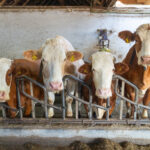
A dangerous superbug commonly found in cattle can jump to humans, and researchers warn that infections may soon become untreatable.
A team from Penn State University discovered that Salmonella Dublin has become increasingly resistant to antibiotics and is spreading to humans through contaminated beef, milk, or cheese, or through direct contact with infected cows.
Researchers studied 2,150 Salmonella Dublin strains from cattle, humans, and the environment and found they were all genetically similar, making it easier for the bacteria to spread across species.
This bacterium typically causes severe illness or death among cows, but it can also result in serious blood infections among people, especially those in close contact with farm animals. In severe cases, Salmonella Dublin can kill people.
Making matters worse, the new study revealed that cattle strains have the highest levels of antibiotic resistance, particularly to drugs meant for treating infections, such as tetracycline and cephalosporins.
The increasing antibiotic resistance means that infections may become harder to treat, potentially leading to longer illnesses or more severe symptoms for people and animals.
If treatments become less effective, human infections could become more dangerous, especially for vulnerable groups like the elderly, children, or those with weak immune systems.
Study authors added that the US, being a major beef and dairy-producing country, is at an even greater risk of this superbug turning into a widespread health emergency.
Click this link for the original source of this article.
Author: Ray Hilbrich
This content is courtesy of, and owned and copyrighted by, https://www.offthepress.com and its author. This content is made available by use of the public RSS feed offered by the host site and is used for educational purposes only. If you are the author or represent the host site and would like this content removed now and in the future, please contact USSANews.com using the email address in the Contact page found in the website menu.





